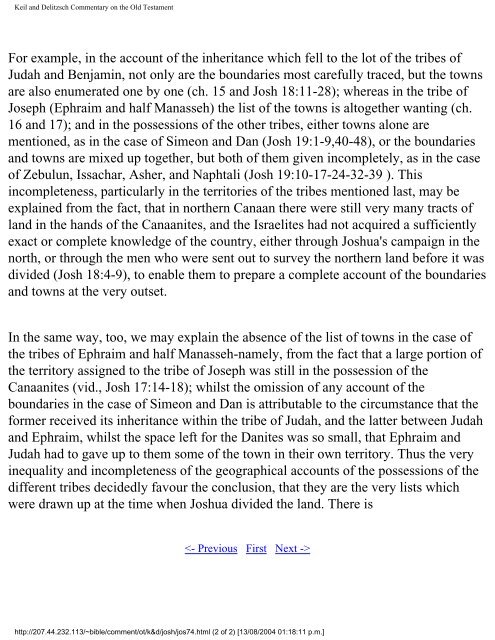Commentary on Joshua - Keil & Delitzsch - David Cox
Commentary on Joshua - Keil & Delitzsch - David Cox Commentary on Joshua - Keil & Delitzsch - David Cox
Keil and Delitzsch
Keil and Delitzsch
- Page 111 and 112: Keil and Delitzsch Commenta
- Page 113 and 114: Keil and Delitzsch Commenta
- Page 115 and 116: Keil and Delitzsch Commenta
- Page 117 and 118: Keil and Delitzsch Commenta
- Page 119 and 120: Keil and Delitzsch Commenta
- Page 121 and 122: Keil and Delitzsch Commenta
- Page 123 and 124: Keil and Delitzsch Commenta
- Page 125 and 126: Keil and Delitzsch Commenta
- Page 127 and 128: Keil and Delitzsch Commenta
- Page 129 and 130: Keil and Delitzsch Commenta
- Page 131 and 132: Keil and Delitzsch Commenta
- Page 133 and 134: Keil and Delitzsch Commenta
- Page 135 and 136: Keil and Delitzsch Commenta
- Page 137 and 138: Keil and Delitzsch Commenta
- Page 139 and 140: Keil and Delitzsch Commenta
- Page 141 and 142: Keil and Delitzsch Commenta
- Page 143 and 144: Keil and Delitzsch Commenta
- Page 145 and 146: Keil and Delitzsch Commenta
- Page 147 and 148: Keil and Delitzsch Commenta
- Page 149 and 150: Keil and Delitzsch Commenta
- Page 151 and 152: Keil and Delitzsch Commenta
- Page 153 and 154: Keil and Delitzsch Commenta
- Page 155 and 156: Keil and Delitzsch Commenta
- Page 157 and 158: Keil and Delitzsch Commenta
- Page 159 and 160: Keil and Delitzsch Commenta
- Page 161: Keil and Delitzsch Commenta
- Page 165 and 166: Keil and Delitzsch Commenta
- Page 167 and 168: http://207.44.232.113/~bible/commen
- Page 169 and 170: http://207.44.232.113/~bible/commen
- Page 171 and 172: Keil and Delitzsch Commenta
- Page 173 and 174: Keil and Delitzsch Commenta
- Page 175 and 176: Keil and Delitzsch Commenta
- Page 177 and 178: Keil and Delitzsch Commenta
- Page 179 and 180: Keil and Delitzsch Commenta
- Page 181 and 182: Keil and Delitzsch Commenta
- Page 183 and 184: Keil and Delitzsch Commenta
- Page 185 and 186: Keil and Delitzsch Commenta
- Page 187 and 188: Keil and Delitzsch Commenta
- Page 189 and 190: Keil and Delitzsch Commenta
- Page 191 and 192: Keil and Delitzsch Commenta
- Page 193 and 194: Keil and Delitzsch Commenta
- Page 195 and 196: Keil and Delitzsch Commenta
- Page 197 and 198: Keil and Delitzsch Commenta
- Page 199 and 200: Keil and Delitzsch Commenta
- Page 201 and 202: Keil and Delitzsch Commenta
- Page 203 and 204: Keil and Delitzsch Commenta
- Page 205 and 206: Keil and Delitzsch Commenta
- Page 207 and 208: Keil and Delitzsch Commenta
- Page 209 and 210: Keil and Delitzsch Commenta
- Page 211 and 212: Keil and Delitzsch Commenta
<strong>Keil</strong> and <strong>Delitzsch</strong> <str<strong>on</strong>g>Commentary</str<strong>on</strong>g> <strong>on</strong> the Old Testament<br />
For example, in the account of the inheritance which fell to the lot of the tribes of<br />
Judah and Benjamin, not <strong>on</strong>ly are the boundaries most carefully traced, but the towns<br />
are also enumerated <strong>on</strong>e by <strong>on</strong>e (ch. 15 and Josh 18:11-28); whereas in the tribe of<br />
Joseph (Ephraim and half Manasseh) the list of the towns is altogether wanting (ch.<br />
16 and 17); and in the possessi<strong>on</strong>s of the other tribes, either towns al<strong>on</strong>e are<br />
menti<strong>on</strong>ed, as in the case of Sime<strong>on</strong> and Dan (Josh 19:1-9,40-48), or the boundaries<br />
and towns are mixed up together, but both of them given incompletely, as in the case<br />
of Zebulun, Issachar, Asher, and Naphtali (Josh 19:10-17-24-32-39 ). This<br />
incompleteness, particularly in the territories of the tribes menti<strong>on</strong>ed last, may be<br />
explained from the fact, that in northern Canaan there were still very many tracts of<br />
land in the hands of the Canaanites, and the Israelites had not acquired a sufficiently<br />
exact or complete knowledge of the country, either through <strong>Joshua</strong>'s campaign in the<br />
north, or through the men who were sent out to survey the northern land before it was<br />
divided (Josh 18:4-9), to enable them to prepare a complete account of the boundaries<br />
and towns at the very outset.<br />
In the same way, too, we may explain the absence of the list of towns in the case of<br />
the tribes of Ephraim and half Manasseh-namely, from the fact that a large porti<strong>on</strong> of<br />
the territory assigned to the tribe of Joseph was still in the possessi<strong>on</strong> of the<br />
Canaanites (vid., Josh 17:14-18); whilst the omissi<strong>on</strong> of any account of the<br />
boundaries in the case of Sime<strong>on</strong> and Dan is attributable to the circumstance that the<br />
former received its inheritance within the tribe of Judah, and the latter between Judah<br />
and Ephraim, whilst the space left for the Danites was so small, that Ephraim and<br />
Judah had to gave up to them some of the town in their own territory. Thus the very<br />
inequality and incompleteness of the geographical accounts of the possessi<strong>on</strong>s of the<br />
different tribes decidedly favour the c<strong>on</strong>clusi<strong>on</strong>, that they are the very lists which<br />
were drawn up at the time when <strong>Joshua</strong> divided the land. There is<br />
<br />
http://207.44.232.113/~bible/comment/ot/k&d/josh/jos74.html (2 of 2) [13/08/2004 01:18:11 p.m.]



